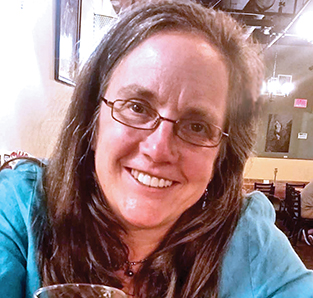
Originally published: May 27, 2020
With three contested races in this year’s Town Election, we are presenting candidate interviews for those races to help voters decide between the candidates. This week we feature Brian Burke (incumbent) and Ellen Sturgis, who are both running for the open one-year Selectman’s seat (time remaining on former Selectman Don Hawkes’ term after he resigned). Both candidates were given the same questions and their responses appear UNEDITED below.

Introductions
Brian Burke: Brian Burke is a 24-year resident of Stow. Currently, he serves as a Hearing Officer with the Massachusetts Department of Corrections. Previously, he was an Assistant Attorney General.
In addition, he has served as a member or associate on these Town government boards and committees, Stow Board of Selectmen (2014-2020), Chair, Stow Board of Selectmen 2017-2018, Council on Aging (2008-20); (Elementary) School Building Committee (2004-05); Finance Committee (2005-06); NRSD School Committee (2005-2011) Chair, NRSD School Committee (2009-11).
Brian Burke is seeking re-election to fill out the term vacated by his colleague Donald Hawkes who resigned this past January.

Ellen Sturgis: I’m Ellen Sturgis and I decided to run again because I believe this year presents a unique opportunity to think differently about where Stow is heading. I’ve lived in Stow nearly 30 years and have lived in Massachusetts all my life. Professionally, I’m a nonprofit consultant, specializing in finance & opera-tions. I have an MBA in finance and graduated from Hampshire College, where I now serve as Trus-tee. My husband Michael and I raised our two children, now both in their 20s, and both attended Stow public schools.
I have previously served as School Committee representative, Selectman and chair of two school building committees which helped the town approve the Center School renovation/addition. I’ve also served on various boards including the Randall Library Second Century Fund and the Mabel Hale Fund, and was assistant town moderator, co-coordinator of the Stow Community Bloodmobile and co-founder of the Nashoba Robotics Team.
As the Board of Selectmen is by charter deemed to be the chief executive officer of the town, I believe my financial, business and nonprofit experience make me a qualified candidate for Selectman.
Question 1: The Selectmen will be choosing a new Town Administrator in the coming months. What are the top three skills you believe the successful candidate should have?
BURKE: According to our Board’s current timeline, a new Town Administrator should be appointed before my current (COVID extended) term ends. Pursuant to Town Charter, we have appointed, from among many fine volunteers, a suburb Search Committee. I am confident that the Search Committee will present the Board with a handful of excellent candidates at our next meeting on May 26th. We are then scheduled to conduct interviews of these finalists next month.
But in all of these finalists, I am looking for government managerial experience. As our Town’s Chief Financial Officer, our next TA should be highly skilled in crafting and managing budgets. I am looking for a someone who will fulfill the requirements in our Charter to effectively supervise Stow’s municipal employees. Of course, the new Town Administrator must know how to work cooperatively and collegially with the Board of Selectmen and the other volunteer boards and committees. An excellent starting point for the ideal qualities in our new Town Administrator would be to look at our current Town Administrator. I am pleased that TA Wrigley has agreed to continue to work with Stow on a part-time basis (about eight hours a week) to furnish guidance and context to our next Town Administrator. We will need all recent and relevant knowledge and experience to help us through these challenging times.
STURGIS: Experience, a track record of successful teamwork, and an appreciation of small towns.
Massachusetts is rather a quirky place when it comes to municipal government; we have 351 individ-ual entities all deciding independently on policies and programs. As one of the small towns, I think Stow can and should benefit from more regional cooperation and collaboration, and I would hope the next town administrator has both an appreciation of and experience in working “across borders”. In addition, though financial management is a critical part of the job, it is not the only skill required. An experienced manager with an eye on best practices and high standards would help us as we review our budget and hire key positions over the coming year. I would like to see someone who has been an assistant town manager/administrator come to this position full of energy and enthusiasm for what Stow has to offer.
Question 2: With the potential negative economic impact to the Town of Stow from the current pandemic, what measures would you recommend to mitigate that impact?
BURKE: Regrettably, it is impossible to definitively forecast the full extent of the dire economic conditions currently facing our Town and all the other Commonwealth municipalities. While we have frequently regretted this fact, Stow’s undiversified tax base may prove to be a boon. Almost all of our municipal revenues derive from property and excise taxes. And while it is far from certain, we should be able to recoup most of the revenues that we are currently forgoing in the short-term from our recent property tax deferral. But state aid revenues on which we depend to build our municipal budget will be a highly uncertain.
Even a significant reduction in $750,000 of generalized and Chapter 90 state aid could probably be accommodated out of a $32,000,000 municipal budget – using extraordinary measures that every town and city in this country may be forced to adopt. I am extremely pleased, therefore, that our Town’s budget this year is below level funded and Department Heads have already been asked to reduce expenses in anticipation of revenue shortfalls next year. However, the Commonwealth’s state education aid may also be correspondingly reduced. Stow and its two school districts must immediately begin working together cooperatively in order to offset state aid reductions by considering budget adjustments that will not unfairly impact our vulnerable residents, especially our seniors and others living on fixed incomes.
STURGIS: Unlike many towns, Stow is near the top for affluence and percent of budget funded by residential taxes. For a change, this works in our favor, as commercial tax revenue is falling. But with a world wide recession anticipated, the impact could be multi-year and then all jobs, incomes and property taxes will be less secure.
The biggest immediate risk we face is that state aid will be reduced if state receipts fall. This will most certainly impact school aid, but also funds from which we plan to draw for highway and school projects, among others. Zero based budgeting is a good strategy regardless of circumstance, but in this case, I would urge the Town and our new Administrator to adopt it. The School Committees (both Nashoba & Minuteman) will have to review their budgets and make cuts at least for this year to man-age those changes. I would expect our state funded projects would be postponed, though the larger capital projects which are funded through debt could still continue. My primary concern is that the Mass School Building Authority may run out of money which would leave the High School project in question.
Question 3: Capital Planning Committee has cited four potential $1+ million projects Stow could face in the next decade — PFAS clean-up, Nashoba high school building construction, expanding Randall Library, and renovating Town Hall. In what order would you prioritize those projects and how can the town diminish the potential tax burden on property owners?
BURKE: Our Board of Selectmen must be ready to responsibly deal with likely revenue shortfalls using all available fiscal mechanisms starting on Jun 29th. A devastating and long-lasting economic crisis arising out of the COVID-19 pandemic may force us to rethink some or all of those projects that the Capital Planning Committee has put on our radar screen. What once may have been big “asks,” may now be out of our reach in the immediate future. On the other hand, I am pleased to report that the Capital Planning and Finance Committees have made recommendations to delay several more minor capital projects until next year when we will possess a better understanding of our finances.
But prioritizing the capital projects under consideration might also be out of our reach. If the Massachusetts DEP orders us to conduct extensive PFAS remediation, outlays for that work may become unavoidable – although I am on record as demanding a compelling justification for any such mandated expenditures. So too, if the Commonwealth approves partial funding for the construction of a new Nashoba High School, the member towns will collectively decide whether or not to support that capital project. Stow Selectmen must be ready to address these choices from day one.
STURGIS: Top priority: The High School has been undersized for our current population for nearly a decade. The key is to get the approval from the state agency (MSBA). Our kids deserve much better facilities: as we learned while redesigning Center, there is a direct correlation between quality of the space and quality of learning.
As a health issue, the PFAS cleanup has to be high on the list, but we won’t know the cost without more data. I support Article 60 at the ATM to fund more research. As town leaders, we have to be informed as to the true risk levels and potential sources of contamination. We need guidance on both the science and the legal liabilities.
I appreciate deeply both the Randall Library and Town Hall for their historic significance. But in both cases, we need to have a comprehensive plan of the use of each building over the next 20 years. A smart resident used to ask us regularly Is this a Need or a Want? What do we need from all of our facilities collectively and how do we best meet those needs? These are the questions the Selectmen should be asking before we move forward.
Closing Statement:
BURKE: I originally had no intention to run for Selectmen this year. I felt two terms on the Board of Selectmen, along with my previous six years on the Nashoba Regional School Committee, was a sufficient degree of commitment to my community. But in the last several months, we discovered that our Town is facing unexpected crises – both financial and of confidence – that are unprecedented and worrisome. I do not choose to walk out on our Town at this critical time, and I am prepared to put in the additional time and work necessary to bring us through this critical period. I believe that I have the current knowledge and experience necessary to help Stow deal with this crisis most effectively. In only another ten months, a full three-year term will open up and any Stow residents looking to make a long-term commitment to the Stow Board of Selectmen, as I have, will be free to do so. But I won’t be among them. For all the reasons discussed above, I am asking for your vote at the Town Election on Saturday, June 27, 2020, either in person or by mail in vote. BrianBurkeofStow@msn.com.
STURGIS: The most important thing I can say in asking for your vote is that I care deeply about Stow. I plan to work with the Selectmen to ensure Stow has a sustaining vision for our future. As noted in the Town Charter, the selectmen, not the Administrator, shall serve as the chief policy making agency, formu-lating guidelines to be followed by all town agencies. We need to show leadership. Controlling the tax burden is my personal goal, in order to allow residents to age in place.
As a finance director for nonprofits, there is never a time when we don’t have to look carefully at eve-ry dollar spent, and we rarely can presume our revenue is secure. I will put this experience to work as we take a fresh look at the town budget. I have worked with a range of organizations, boards, and businesses close up. Managing the Center School building committee process was all about listening to all sides and building consensus on the best, most economical, educationally sound solution.
Having been on the Board before, I know the work it takes, and I’m ready to once again commit my-self to Stow’s successful future. Thanks for listening.